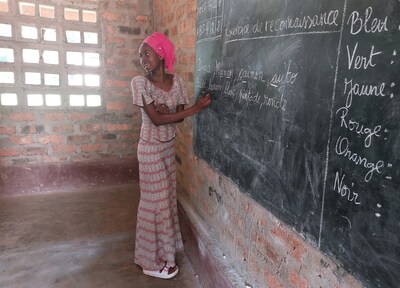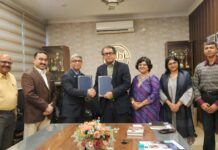Education Cannot Wait, UNICEF and partners are empowering children with disabilities to access inclusive education and reach their full potential in the Central African Republic
BAMBARI, Central African Republic, Oct. 31, 2025 /PRNewswire/ — Along a dusty street in the town of Bambari, Zénabou, 14, who was born deaf and non-speaking, used to watch other children walk to school each morning.

“It was torment because, even though I was burning with a desire to find out what happened in the schools where these children went, I realised very early on that it was a system that wasn’t made for me because I was different.”
For many children with disabilities, the doors to education have long remained shut. Yet across the Central African Republic (CAR), stories like Zénabou’s are beginning to change. Children with disabilities are finally receiving the support and opportunities they deserve thanks to a new inclusive education pilot initiative. The programme provides learning materials, mobility aids, and specialized classes in Braille and sign language, while creating a network of community support for families and integrating children with disabilities into local schools.
This groundbreaking initiative is funded by Education Cannot Wait (ECW), the global fund for education in emergencies and protracted crises in the United Nations, and delivered by UNICEF, partners like Humanity and Inclusion and national organizations, including the ‘Centre d’Alphabétisation et de Formation en Braille pour les Aveugles en Centrafrique’ and the ‘Association Nationale des Déficients Auditifs de Centrafrique’.
A Door Opens
Today, Zénabou sits at her school desk, smiling as she watches her teacher write on the blackboard. To a passer-by, it’s an ordinary scene. To Zénabou, it’s extraordinary.
In a country where stigma around disabilities runs deep, few initiatives have ever focused on improving access to education for children like her. Before school, Zénabou spent her days helping her mother with housework – washing dishes, cleaning clothes and fetching water.
“The day I went to school for the first time, I suddenly realised that I wasn’t the only one in this situation. Seeing more than 30 deaf people in the same place was astonishing!”
Through a multi-year investment from ECW, UNICEF – in partnership with Humanity and Inclusion and local organizations, and with the support of local educational authorities – established specialised classes for deaf and visually impaired children in Bambari within ordinary primary schools. Here, children who have never attended school are taught to read, write and count, learning Braille or sign language – skills that open the door to a world of learning.
“It’s a miracle that a child who cannot speak can now write,” says Zénabou’s Father. “It proves that this school brings blessings.”
Before, Zénabou could barely communicate. Her parents, both illiterate, wanted more for her but saw few options. Everything changed when she gained access to education. “Zénabou is now able to assert herself as a person, despite the communication barriers caused by the fact that she is deaf. I’m now optimistic about Zénabou’s future – I know she’s going to succeed,” her father says.
Zénabou’s parents are her biggest champions. Her mother, though not disabled herself, is a member of the National Organisation of Disabled People’s Associations. At one meeting, she heard about the new learning opportunity for deaf children.
The ECW-funded initiative is also strengthening national organizations to promote and implement inclusive education. A new partnership with the National Association of Hearing-Impaired Persons has supported the adaptation of education for children with hearing impairments in Bambari, with plans to expand to other regions.
Zénabou’s parents are grateful to now have community support and opportunities that give their daughter the tools to reach her full potential.
Education Crisis in CAR
The Central African Republic is one of the toughest places in the world to be a child. Conflict, displacement and instability have destroyed services and limited access to healthcare, livelihoods and education. Years of violence have devastated schools, leaving more than a million children and adolescents out of school.
Children with disabilities face the greatest barriers – compounded by stigma and the lack of specialized support. Addressing these challenges requires rebuilding education infrastructure, promoting inclusive teaching and combating social discrimination to ensure that every child can learn.
ECW recently extended its Multi-Year Resilience Programme in the CAR. The programme increases access to a holistic, quality education in protective learning environments, strengthens national and local education systems, and provides targeted support for girls and children with disabilities, like Zénabou. Through the inclusive education pilot initiative, partners like UNICEF are supporting the national government to promote inclusive education and continue to improve access to learning – with one clear goal: to ensure children with disabilities can go on to participate and learn with all their peers in the same learning space.
An Adventure Ahead
Having the opportunity to go to school like other children has transformed Zénabou’s life. Today, she feels included and empowered to build a better future for herself.
“I’m learning a lot. I really enjoy writing because I discover so many things through it.”
Her story shows the transformative power of inclusive education and the incredible potential of children with disabilities when given the opportunity to thrive. But there is still much to do to ensure all children can access the education they deserve.
The inclusive education initiative in CAR is just the beginning. Global donors and partners must help sustain and expand these programmes, providing vital resources and advocacy for children with disabilities.
By investing in education for all, including those with disabilities, we unlock opportunities for children like Zénabou, empowering them to reach their full potential. Together, we can create a world where every child, regardless of ability, has the chance to succeed.
“I still don’t know where this adventure is going to take me… but one thing’s for sure: today, I can read, write and count, just like the other children. I can also communicate effectively, thanks to sign language! One day I’d like to work in the humanitarian sector.”
By Jelena Borak
Photo – https://mma.prnewswire.com/media/2810008/Education_Cannot_Wait_Zenabou.jpg
![]() View original content:https://www.prnewswire.co.uk/news-releases/isolation-to-inclusion-zenabous-story-302600688.html
View original content:https://www.prnewswire.co.uk/news-releases/isolation-to-inclusion-zenabous-story-302600688.html





































